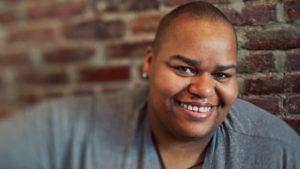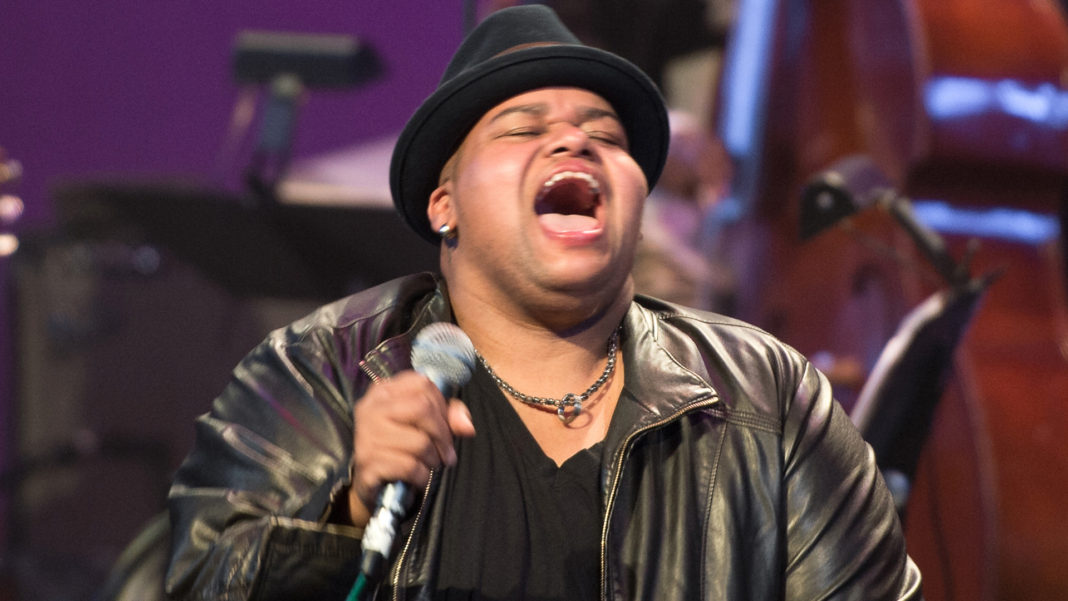I interviewed actor Billy Dee Williams many years ago about his role in The Empire Strikes Back. He told me that before he was offered the part he “didn’t think my people made it to the future.” That’s because he hadn’t seen a Black actor in a sci-fi film. Perhaps he wasn’t familiar with author Octavia E. Butler, who was a science-fiction writer who absolutely wrote the kind of stories he was missing. One person who did know Butler’s work was singer/songwriter Toshi Reagon.
Reagon is the daughter of Bernice Johnson Reagon, one of the founders of the group Sweet Honey in the Rock. The books inspired both mother and daughter, particularly 1993’s Parable of the Sower, a dystopian novel set in 2020. The Reagons set out to write a theatre piece that both tells the novel’s story and references two centuries of Black music in the process. Their adaptation of Parable of the Sower is being performed at UCLA’s Royce Hall on Saturday night.
Earlier this week I spoke with Toshi Reagon about her relationship to this story, what it has to say about our world today and finding representation in the arts. Here are excerpts from that conversation that have been edited for length and clarity.
Octavia E. Butler said, “Repressive societies always seemed to understand the danger of ‘wrong ideas.'” I’m wondering whether you share that view as it relates to our contemporary society.
Yes. She has a lot of really amazing quotes and in Parable there are so many of them and they relate so well to this time. I always imagine that she was working on this in the late 1980s. That was the Reagan era and I remember the Reagan presidency. I was 16 when he got elected and it was so shocking. I remember everybody being really scared; really frustrated like you had this big revolutionary art coming out of the Civil Rights Movement and then you get Ronald Reagan for President. I can feel her being close to that era and writing something which is still relevant today.
What was it about the way that she wrote this story that you felt lent itself to what you and your mother wanted to create?
I think we were just compelled by her vision of a future that was worse than where we were. We don’t usually project to worse things, you kind of stay and survive where you are. I think she wrote a novel that said things are bad. The child going into the future is going to have this understanding of change as a force of movement, a force of life. That blew us away. We could both hear a lot of music coming out of those ideas.
How important was it for Butler to have written these stories, not just for what they were, but also for what and who they represented about the future?
That’s one of the biggest gifts she’s given us. It’s so enormous. The term Afro-Futurism is an insistence we’re in the future. It’s one of the best things about her book. It’s so important to think about the way racism happens and it denies whole groups of people. It affects education, the justice system, the economy, it affects access. You can live your life thinking you don’t belong in the present day, let alone the future. Octavia and other writers and artists say not only do I live here now, but I’ll be in the future.

Until very recently there were not too many Black women in stories set in the future. We certainly, as far as I can tell, haven’t seen too many black gay women like you depicted in the future. How does that lack of representation land with you and how important is it for you and your voice to be heard for who you are vis-a-vis the work you do?
It’s really important. Eventually we have to be seen on the planet. I think ultimately Octavia’s work is about that – all humans, wherever you come from, whatever your cultural identity, your nation, your religion. We are stuck in a battle and the earth is deteriorating because we are stuck on this planet and not being one with the planet like all other species in the world. It is important for my voice to be heard, for your voice to be heard, for other voices to be heard. I think all the time about why we treat people so badly. It breaks your heart.
Since you first premiered Parable of the Sower, what has surprised you most about the reactions you get from individuals and audiences?
It’s kind of surprising to me that so many people don’t know her work. It is so relevant to large communities of people, particularly people of color, particularly Black people, Black women and artists.
In a New York Times interview published in 2000, Butler was asked if she was pessimistic about the future. Her response was, “I’m not pessimistic about much of anything. No, I’m hopeful. The only problem that we human beings really suffer from, and this is important to us as a species, is that we tend to do the right thing when we get scared.” How close to doing the right thing are we today?
She is so right. How many times have you been in a bad situation and even if you are not religious you begin praying? I think we operate out of extreme emotions. The corona virus is spreading across the earth and some people’s response to that is to charge three-to-four hundred dollars for a case of masks. People are doing strange things out of fear. Our culture is “we want things and we want things now.” When you get scared, everything changes. When you need help it doesn’t matter the race of the person. People need to operate out of the best of their capacities.
At press time only 21 seats were still available for Parable of the Sower. For tickets go here.
All photos Courtesy of Parable of the Sower and CapUCLA










